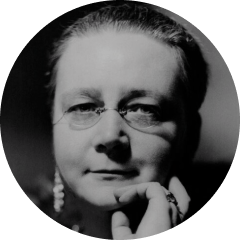Dorothy L. Sayers
(1893–1957)
Dorothy L. Sayers (1893–1957), crime writer, playwright, translator, essayist. A graduate of Somerville College, Oxford (1st Class Hons. in modern languages and medieval literature), she worked in publishing and as a schoolteacher before becoming a copywriter for the advertising firm of S. H. Benson, 1922–31 (where she coined the slogans ‘Guinness is good for you’ and ‘It pays to advertise!’). In 1923 she started a series of detective fictions featuring the hero Lord Peter Wimsey (eleven novels and two collections of stories). Her playwriting career was launched when she collaborated with her friend and contemporary Muriel St Clare Byrne on Busman’s Honeymoon (1935); her other plays included The Zeal of Thy House, written for the Canterbury Festival in 1937; The Devil to Pay (1939), a version of the Faust legend, also written for Canterbury; and The Man Born to Be King (a cycle of radio plays broadcast by the BBC between Dec. 1941 and Oct. 1942). A prominent and devout Anglican who enjoyed friendships with C. S. Lewis and Charles Williams, after the war she set herself to translate Dante’s Divine Comedy, completing her work on the Inferno and Purgatorio but leaving the Paradiso to be finished off after her death; in addition, she completed a verse translation of the Song of Roland. See Barbara Reynolds, Dorothy L. Sayers: Her Life and Soul; Reynolds, The Passionate Intellect: Dorothy L. Sayers’ Encounter with Dante; James Brabazon, Dorothy L. Sayers: A Biography; and Alzina Stone Dale, Maker and Craftsman: The Story of Dorothy L. Sayers; and Mo Moulton, Mutual Admiration Society: How Dorothy L. Sayers and Her Friends Remade the World for Women (2019); Francesca Wade, Square Haunting: Five Women, Freedom and London Between the Wars (2020).
